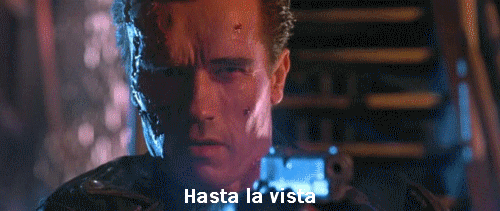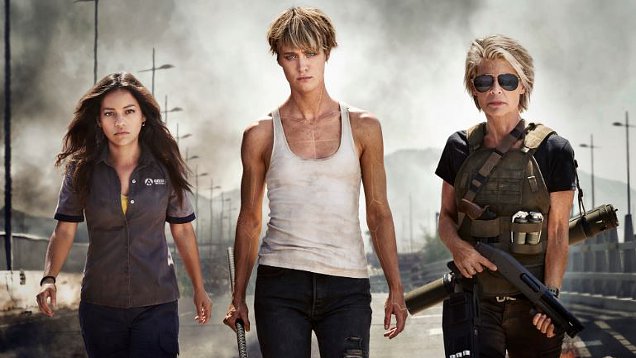Revisiting the terrific (and terrible) Terminator movies

With the arrival later this year of the next Terminator movie, which has been described as a direct sequel to Terminator 2: Judgement Day, Blake Howard revisits a franchise that is sometimes terrific, sometimes terrible, but always bloody memorable.
The one-two punch of director James Cameron’s first two Terminator installments, which arrived in 1984 and 1991, are undeniably a couple of the best sci-fi and time travel movies ever made. But the critical consensus is that the series after 1991 is littered with metal corpses – each sequel saying “hasta la vista baby” to the quality of those initial works.
Well, with the upcoming Cameron-produced, Tim Miller-directed Terminator: Dark Fate calling itself the direct sequel to Terminator 2: Judgement Day, it’s time to travel back (and forward) in time to revisit all the Terminator movies, to see if there’s anything salvageable in the scrap.
The Terminator & Terminator 2: Judgement Day
The Terminator was an instantly iconic masterwork. The monolithic beast Arnold Schwarzenegger landed the role of his career as the T-800 – a cybernetic organism dispatched by AI overlords Skynet to eliminate their greatest enemy, John Connor, before his birth. Special-effects wizard Stan Winston’s state of the art work makes us believe in the machine beneath the man. Sarah Connor (Linda Hamilton) and Kyle Reese (Michael Biehn) are pursued in a tantalising cat and mouse chase through time, the stakes being the very survival of our species.
In 1991, Cameron, Schwarzenegger and Hamilton returned with Terminator 2: Judgement Day, taking us to Skynet’s latest attempt on John Connor’s life. This time teenage John (Edward Furlong) must avoid the sharp and slippery T-1000 (Robert Patrick). The action is grander and more explosive without ever letting go of the ferocity of every impact. The crippling inevitability of humanity’s nature for self-destruction pours through Hamiliton’s mesmerising gaze, and Schwarzenegger embraces the flip from unstoppable force to immovable protector with grace.

Terminator 3: Rise of the Machines (2003)
Director Jonathan Mostow took the first steps to continue the iconic franchise and switched off the deeply philosophical underpinnings about the future, to assault us with the boom crash opera of muscular machine versus a premonition of a killer sex robot.
An off-the-grid and directionless John Connor (tragically played by Nick Stahl and not Edward Furlong) seeks meaning in life with no Judgement Day on the horizon. That is until his protector is sent back through time by Katherine Brewster, aka future Claire Daines. This is the Terminator lore through the sweat of a jockstrap. Its blunt, anti-camp buffoonery just wants to assault your senses and let your brain have a nap.
Terminator Salvation (2009)
Terminator: Salvation took the most overt departure from the series format to that point. Rather than focusing on the intimate war between humanity and one potential oppressive AI future in our present, it chose to pivot to John Connor’s apocalyptic world. For this outing Christian Bale assumes the role of Connor, a soldier struggling to convince the remaining military brass of his grasp of Skynet’s movements/motivations. Stalking the wasteland is Sam Worthington’s Marcus Wright, a cybernetic Mad Max, and proto father figure for Kyle Reese (Anton Yelchin).
The Connor storyline here is earnest and tiresome – despite the absolutely ripping cast and inventive action set-pieces. The wasteland and Wright’s wandering pursuit for answers is just the kind of bleak and ambivalent alternate perspective that an expanding series could use. It’s all too easy for folks to talk shit about McG’s Salvation (citing the director’s personality or Bale’s behind the scenes meltdown) but I’m not willing to totally write-off the film.
Terminator Genisys (2015)
Genisys presents perhaps the series most wasted opportunity yet. While Rise of the Machines and Salvation leant into John Connor, and ritualistically ignored Sarah, Genisys shows that you can’t go further into Sarah’s past to eliminate her before John could even be a glimmer on her horizon.
In retrospect, Genisys is an aspirational failure, rather than an elemental one. Firstly we get to see the moment that until that point we’ve been left to imagine: Skynet’s desperation to develop time travel and attempt to prevent their impending demise. Just before we travel back to a visually identical 1984 Los Angeles, Skynet abducts and infects John Connor with technology that makes him a machine. The saviour becomes a pawn to the architects of our demise. Unfortunately the whole enterprise is a little cute and glossy, and the ending is more like a silent fart than a firework.
She’ll Be Back – Terminator: Dark Fate (2019)
What we know about this film, we know from casting, stills and descriptions from yet to be released clips that played at CINEMA-CON earlier in the year. According to Indiewire, one of these clips featured a time-travelling Mackenzie Davis arriving in Mexico City and encountering police. The second sees Hamilton, as Sarah Connor, wielding a bazooka to assist Davis’ character in a scrap with two Terminators. Hamilton delivers the line “I’ll be back,” and the crowd reportedly went wild.
It’s refreshing to know that Sarah Connor is front and centre. It’s about damned time. It’s hard to think of any character who has gone through a better original film and sequel transition – both physical and psychological – then Hamilton.
















